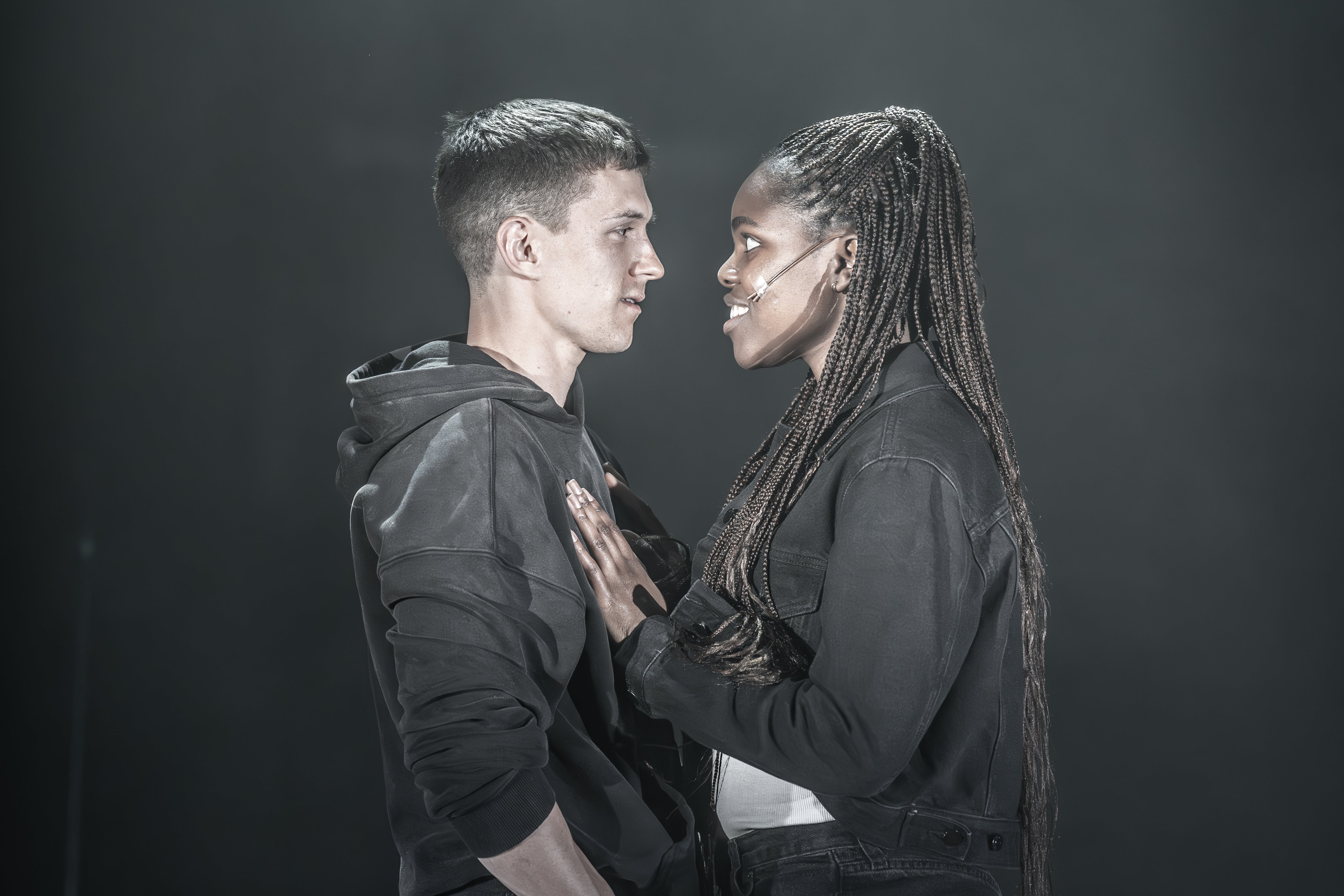Look, we all know why we’re here. It’s what Jamie Lloyd does: takes a classic play, strips away a load of stuff, and puts a massive star at the centre of it to sell all the tickets and sort of trick teenagers into watching Ibsen or Pinter or Shakespeare. It’s the same deal here, with someone of supernova quality: Tom Holland – aka Spiderman himself – returning to the London stage for the first time since playing Billy Elliott in 2008.
Except, this time, early announcements about the feverishly anticipated production were overshadowed by an online campaign of abuse against Francesca Amewudah-Rivers, the young actor cast as Juliet. What an utter cesspit the world seems sometimes. The torrent from these brainless racists led to an open letter of solidarity signed by more than 800 Black creatives, and a statement from Lloyd’s company condemning the abuse. This all happened before the play had opened – before anyone had a chance to see what it’s actually like.
So. What’s it actually like?
This is less “Jamie Lloyd does Shakespeare”, more “Jamie Lloyd does Jamie Lloyd”; a Romeo & Juliet muttered through head mics, housed in a shell of industrial chic – or it was chic the first time Lloyd did it, but now it just looks like a fetish for ventilation ducts.
It’s set in Verona, which we can tell because it’s in the second line of the play and because there are big letters on stage that say “Verona”. That’s the closest Lloyd comes to a prop, by the way. No potions or poisons or daggers here. No set either, or rather one of regular collaborator Soutra Gilmour’s non-sets, making the stage look like a stage. There’s really high-quality video and Jon Clark’s amazing lighting provides the rest of the set, creating shapes and sculpture from light and shadow.
There’s the prologue, a bit of fighting performed as whispers into microphones, and on comes Holland, a camera following him from backstage. He’s tearful, morose, muttering. He’s a very sad boy in a tight white vest.
It’s what Lloyd was doing in Sunset Boulevard with Nicole Scherzinger and in A Doll’s House with Jessica Chastain, the toolkit deployed in full, and it’s just as interesting: it strips the play back to bare bones, especially with Nima Taleghani’s super snappy adaptation which nips along at pace. The play seems fresh; there’s a real intense focus on the words.
But it’s only when we get to the balcony scene (no balcony obviously) that it properly comes alive. It’s pure intense passion. Holland and Amewudah-Rivers stand face to face, hips brushing, lips almost touching, and murmur their love to each other.
Holland’s acting skills are abundant in all the bits when he’s not speaking. That’s not a criticism, honestly: it’s just that his face is so full of detail – detail that cameras and close-ups can really capture – and his reactions to other characters so full and attentive. His line delivery is a bit flat, though – too much sing-song quality as he quietly trots out the pentameter.

Amewudah-Rivers is the opposite: her face remains mostly impassive, her cool insouciance a nice contrast to Holland’s puppyish affection, and she fills her softly murmured lines with different textures. Essentially, he acts best with his face, she with her voice.
Amid the moody coolness there’s a brilliant performance from Freema Agyeman as a sulky, cheeky nurse leching over Romeo and having a laugh with Juliet. But really there are no blow-away performances here, nothing for the ages. How can there be when the actors are so constricted by the production that’s been built around them? As much as it’s meant to be a stripping back, soon those cameras, the constant murmuring, the grinding sounds, the need to be cool ALL THE TIME gets in the way of performances. It imposes too much on them rather than liberating them.
If it had ended at the interval, it would have been brilliant. Instead, it becomes a thing of diminishing returns. Second-half scenes are too effortful, some have no emotional impact. As for the ending, well, it’s a bit of a letdown. They die, but theatrically: earpieces out, eyes closed, sitting on the front of the stage like bouncers having a nap after a long shift at a warehouse rave.
Credit to Lloyd, nothing is ever boring, which can’t be said for most Shakespeare productions. But this is Romeo & Juliet, and “not boring” isn’t enough. We need more passion, more energy, to make us not want the lovers to die, and then to feel sad when they do. By the end it feels like nothing has changed. Everything has remained too muted and beholden to the concept. Love is a many-splendoured thing, not a mutter into a mic.
Duke of York’s Theatre, until 3 August

